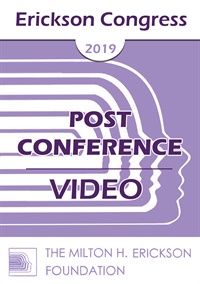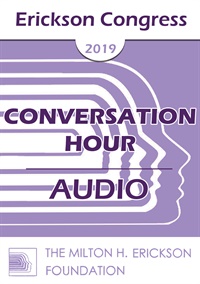
- Average Rating:
- Not yet rated
- Topic Areas:
- Conversation Hours | Genomics | Brief Therapy | Psychotherapy | Neuroscience
- Categories:
- Erickson Congress | Erickson Congress 2019
- Faculty:
- Kathryn Rossi, PhD
- Duration:
- 58 Minutes
- Format:
- Audio Only
- Original Program Date:
- Dec 14, 2019
- Short Description:
- Great strides have been made in PsychoSocial Genomics as well as the placebo effects in psychotherapy. We will share our views of how these new state-of-the-arts sciences can gently be integrated into psychotherapy sessions and improve outcomes.
- Price:
- $15.00 - Base Price
- Average Rating:
- Not yet rated
- Topic Areas:
- Master Classes | Ericksonian Psychotherapy | Psychotherapy | Brief Therapy | Hypnotherapy | Self-Relations | Utilization
- Categories:
- Erickson Congress | Erickson Congress 2019
- Faculty:
- Bill O'Hanlon, MS | Jeffrey Zeig, PhD
- Course Levels:
- Master Degree or Higher in Health-Related Field
- Duration:
- 4 Hours 49 Minutes
- Format:
- Audio and Video
- Original Program Date:
- Dec 16, 2019
- Short Description:
- Ericksonian hypnotherapy and the Self-Relations approach are experiential methods of change. In combination they can be synergistic. Psychotherapy is best when clients have a first-hand experience of an alive therapeutic process. Such dynamic empowering experiences pave the way for dynamic understandings. Bill O’Hanlon and Jeffrey Zeig will engage with each other and the participants to examine commonalities and differences in their work.
- Price:
- $59.00 - Base Price
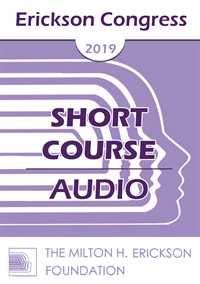
- Average Rating:
- Not yet rated
- Topic Areas:
- Short Courses | Experiential Therapy | Brief Therapy | Resources
- Categories:
- Erickson Congress | Erickson Congress 2019
- Faculty:
- Michael Reiter, PhD
- Duration:
- 1 Hour 3 Minutes
- Format:
- Audio Only
- Original Program Date:
- Dec 12, 2019
- Short Description:
- This presentation will explore the utilization of brief experiential activities in helping clients to access and enhance their naturally occurring resources. Experiential activities help to increase client engagement and participation in therapy as well as connect them to aspect of self that are resourceful. In this session, participants will learn the philosophy behind utilizing in-session experiential activities and how these relate to bringing forth existing client resources.
- Price:
- $15.00 - Base Price
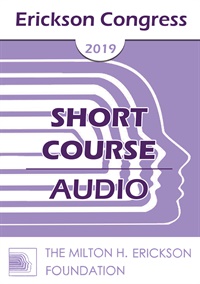
- Average Rating:
- Not yet rated
- Topic Areas:
- Short Courses | Hypnosis | Brief Therapy | Single-Session
- Categories:
- Erickson Congress | Erickson Congress 2019
- Faculty:
- Bob Bertolino, PhD
- Duration:
- 1 Hour 24 Minutes
- Format:
- Audio Only
- Original Program Date:
- Dec 12, 2019
- Short Description:
- There are many ways in which hypnosis can be used to assist clients in accessing and utilizing their internal resources in the service of change. One approach to hypnosis is to create “singles,” brief recordings of three to eight minutes in length, to provide clients with “fingertip resources” that can be accessed quickly and easily. Much like a song on the radio or track played on a phone, brief hypnotic experiences are invitations to clients for rapid absorption, which can facilitate shifts in emotion, cognition, and physiology.
- Price:
- $15.00 - Base Price
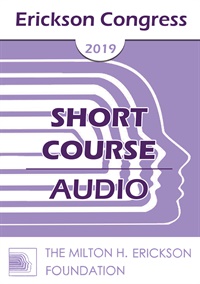
- Average Rating:
- Not yet rated
- Topic Areas:
- Short Courses | Brief Therapy | Pain and Healing
- Categories:
- Erickson Congress | Erickson Congress 2019
- Faculty:
- Timothy Hallbom, MSW | Kris Hallbom, BA
- Duration:
- 1 Hour 23 Minutes
- Format:
- Audio Only
- Original Program Date:
- Dec 12, 2019
- Short Description:
- Created by Tim and Kris Hallbom, Dynamic Spin Release is a powerful set of processes that allows users to quickly release their negative thought patterns and emotions, limiting beliefs and physical pain – in just one brief session. Dynamic Spin Release (DSR) was created using ideas delineated from the world famous psychiatrists, Carl Jung and Milton Erickson – and draws heavily from the psychology of metaphors, NLP, Ericksonian Hypnosis and creative visualization...
- Price:
- $15.00 - Base Price
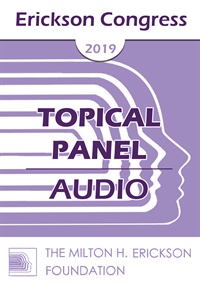
- Average Rating:
- Not yet rated
- Topic Areas:
- Workshops | Obsessive Compulsive Disorder (OCD) | Cognitive Behavior Therapy (CBT) | Brief Therapy
- Categories:
- Erickson Congress | Erickson Congress 2019
- Faculty:
- Reid Wilson, PhD
- Duration:
- 1 Hour 58 Minutes
- Format:
- Audio Only
- Original Program Date:
- Dec 12, 2019
- Short Description:
- You will learn the core strategies of a cognitive therapy intervention that radically and swiftly shifts the client’s point of view regarding both their relationship with OCD and the tactics of change. The principles will be illustrated by brief video clips of a 45-minute initial treatment session from the author's live demonstration at the 2018 Brief Therapy Conference. These will include establishing rapport, developing placebo, generating an outcome picture, dismantling their dysfunctional logical system, and persuading them to adopt the paradoxical frame of reference.
- Price:
- $15.00 - Base Price
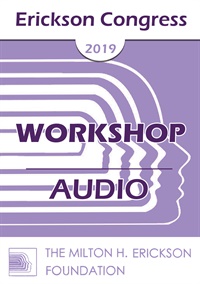
- Average Rating:
- Not yet rated
- Topic Areas:
- Workshops | Energy Psychology | Ericksonian Hypnosis and Therapy Techniques | Hypnosis | Trauma | Psychology | Brief Therapy | Mind-Body
- Categories:
- Erickson Congress | Erickson Congress 2019
- Faculty:
- Robert Schwarz, PsyD
- Duration:
- 1 Hour 54 Minutes
- Format:
- Audio Only
- Original Program Date:
- Dec 13, 2019
- Short Description:
- Energy Psychology (EP) techniques are easy to learn, safe/non-abreactive, evidenced-based, brief approaches, used for everything from bullying to rape to PTSD in veterans to survivors of genocide in Rwanda. Ericksonian Hypnosis and Energy Psychology are brief mind body approaches for treating trauma that both utilize interpersonal neurobiology and memory reconsolidation. We will rapidly review the research and theory supporting them. Then we will focus on teaching you the basics of using emotional freedom techniques (EFT-tapping) within a trauma informed framework and integrating it with Ericksonian principles.
- Price:
- $15.00 - Base Price
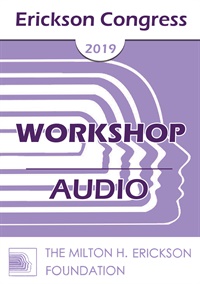
- Average Rating:
- Not yet rated
- Topic Areas:
- Workshops | Hypnosis | Psychotherapy | Brief Therapy | Meditation, Spirituality and Yoga
- Categories:
- Erickson Congress | Erickson Congress 2019
- Faculty:
- Rubin Battino, MS
- Duration:
- 1 Hour 57 Minutes
- Format:
- Audio Only
- Original Program Date:
- Dec 13, 2019
- Short Description:
- Guided imagery (GI) was used initially to help people with life-challenging diseases, yet it is also highly applicable to psychotherapy. A brief history of GI will be presented. The presenter has used it successfully in brief therapy for almost all of his recent clients. Hypnosis is an essential part of GI sessions. The requirements for using GI will be described. It is necessary to tailor the session to the client's individual background and needs, and this will be discussed. The attendees will have the opportunity experience this via a group guided imagery session. And, the session will end with a GI healing meditation.
- Price:
- $15.00 - Base Price
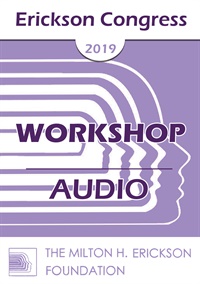
- Average Rating:
- Not yet rated
- Topic Areas:
- Workshops | Brief Therapy | Hypnosis | Experiential Therapy
- Categories:
- Erickson Congress | Erickson Congress 2019
- Faculty:
- Stephen Lankton, MSW
- Duration:
- 2 Hours 3 Minutes
- Format:
- Audio Only
- Original Program Date:
- Dec 13, 2019
- Short Description:
- This workshop will teach six positive techniques that actually make Ericksonian experiential hypnosis successful. Dysfunctional families fail to teach children how to use their experiences to succeed. Consequently, clients learn dozens of self-defeating habits and later present in our offices as adults with depression, anxiety, phobias, etc. The desire to change, insight, and motivation do not counteract those habits - nor does hypnotic suggestion create such change. Experience is the key to cure.
- Price:
- $15.00 - Base Price
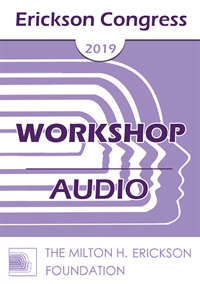
- Average Rating:
- Not yet rated
- Topic Areas:
- Workshops | Love | Brief Therapy | Motivation | Solution Oriented Approach | Therapist Development
- Categories:
- Erickson Congress | Erickson Congress 2019
- Faculty:
- Michael Munion, MA, LPC
- Duration:
- 1 Hour 31 Minutes
- Format:
- Audio Only
- Original Program Date:
- Dec 15, 2019
- Short Description:
- This workshop provides a framework for assessing clients along two important dimensions that impact therapeutic outcome: motivation and sense of agency (one’s perception of their ability to create change in their own lives). This assessment fosters interventions that enhance the capacity for strategic interventions to be truly brief and solution focused. The participant in this workshop will have the opportunity to observe and practice this approach.
- Price:
- $15.00 - Base Price
Please wait ...


